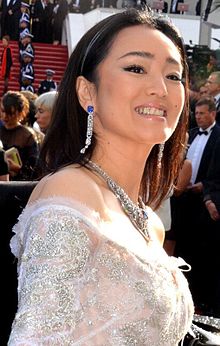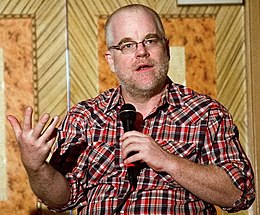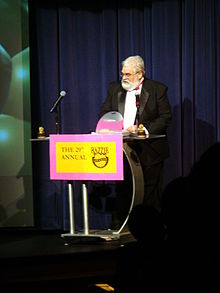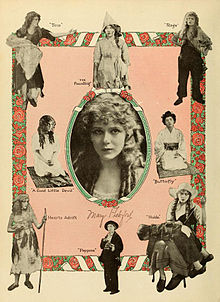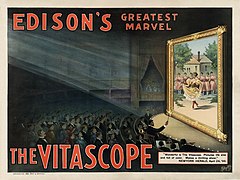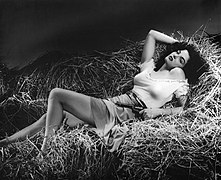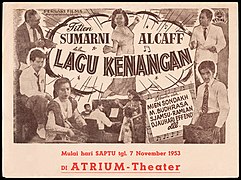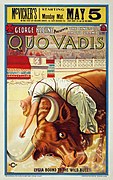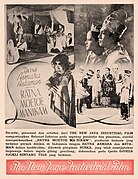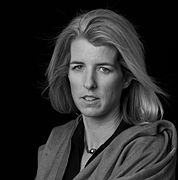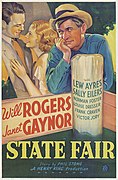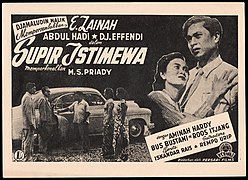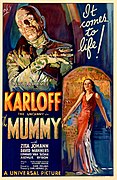Portal:Film
The Film Portal
 A film (British English) – also called a movie (American English), motion picture, moving picture, picture, photoplay or (slang) flick – is a work of visual art that simulates experiences and otherwise communicates ideas, stories, perceptions, feelings, beauty, or atmosphere through the use of moving images. These images are generally accompanied by sound and, more rarely, other sensory stimulations. The word "cinema", short for cinematography, is often used to refer to filmmaking and the film industry, and the art form that is the result of it. (Full article...)
A film (British English) – also called a movie (American English), motion picture, moving picture, picture, photoplay or (slang) flick – is a work of visual art that simulates experiences and otherwise communicates ideas, stories, perceptions, feelings, beauty, or atmosphere through the use of moving images. These images are generally accompanied by sound and, more rarely, other sensory stimulations. The word "cinema", short for cinematography, is often used to refer to filmmaking and the film industry, and the art form that is the result of it. (Full article...)
Featured articles -
Grease 2 is a 1982 American musical romantic comedy film and a standalone sequel to the 1978 film Grease, adapted from the 1971 musical of the same name by Jim Jacobs and Warren Casey. Originally titled More Grease, the film was produced by Allan Carr and Robert Stigwood, and directed and choreographed by Patricia Birch, who choreographed the original stage production and prior film. The plot returns to Rydell High School two years after the original film's graduation, with a largely new cast, led by Maxwell Caulfield and Michelle Pfeiffer in her first starring role.
The film was released in United States theaters on June 11, 1982, and grossed $15 million against a production budget of $11 million, a far cry from its predecessor's $132 million domestic box office. Despite breakthrough roles for Pfeiffer, Adrian Zmed, and Christopher McDonald, the film received mostly negative reviews from critics. Despite this, Grease 2 maintains a devoted fan base decades after its release. (Portal:Film/Featured content)
General images -
Selected image
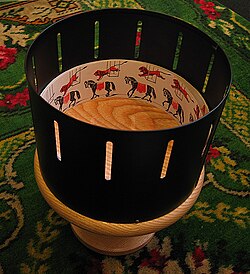
A modern replica of a Victorian zoetrope. A zoetrope is a device that produces an illusion of action from a rapid succession of static pictures.
Did you know...
- ... that Atlanta's "quicker picker-upper" aired martial arts movies, professional wrestling, jazz music, and Japanese-language programming?
- ... that Golden Horse Awards–winning film composer Luming Lu worked as a cram-school tutor before pursuing a career in music?
- ... that the studios of Basin PBS had once been a movie theater, a church meeting space, and a nightclub?
- ... that Japanese actress Junko Ikeuchi was known as the "Queen of TV Dramas" from the 1960s to the 1980s?
- ... that the first day of filming of the psychological thriller Farah coincided with the beginning of the 2019 Lebanese protests?
Selected biography -
Gong Li (simplified Chinese: 巩俐; traditional Chinese: 鞏俐; born 31 December 1965) is a Chinese actress. Regarded as one of the best actresses in China today, she is known for her versatility and naturalistic performance. She starred in three of the four Chinese-language films that have been nominated for the Academy Award for Best International Feature Film.
Gong was born in Shenyang, Liaoning, and grew up in Jinan, Shandong. She enrolled at the Central Academy of Drama in Beijing, from where she graduated in 1989. While a student at the Academy, she was spotted by director Zhang Yimou and debuted in Zhang's Red Sorghum in 1987. Gong and Zhang's professional and personal relationship received much media attention in the Chinese-speaking world, as they continued to collaborate on a string of critically acclaimed movies, including the Oscar-nominated features Ju Dou (1990) and Raise the Red Lantern (1991). For her role in the Zhang-directed The Story of Qiu Ju (1992), Gong won the Volpi Cup for Best Actress at the Venice Film Festival. (Full article...)Featured lists -
News
- September 2: Tributes paid to recently deceased US actor Chadwick Boseman
- October 7: Mockumentary Mister America has world premiere
- May 16: Actor Doris Day dies at 97
- January 22: Former U.S. intelligence agent Tony Mendez, architect of 'Argo' rescue, dies at 78
- Upcoming events
WikiProjects
Selected quote
Main topics
| Filmmaking |
|---|
 |
| Glossary |
- Terms - Animation • Beta movement • Camera • Cult film • Digital cinema • Documentary film • Dubbing • Experimental film • Fan film • Film crew • Film criticism • Film festival • Film frame • Film genre • Film journals and magazines • Film industry • Film manifesto • Film stock • Film theory • Filmmaking • History of film • Independent film • Lost film • Movie star • Narrative film • Open content film • Persistence of vision • Photographic film • Propaganda • Recording medium • Special effect • Subtitles • Sound stage • Web film • World cinema
- Lists - List of basic film topics • List of film topics • List of films • List of film festivals • List of film formats • List of film series • List of film techniques • List of highest-grossing films • List of longest films by running time • List of songs based on a film or book • Lists of film source material • List of open content films
Featured content
Subcategories
Subportals
Related portals
Things you can do
- Add
{{portal|Film}}to the See also section of film-related articles. - Tag the talk pages of film related articles with the {{WikiProject Film}} banner.
- Explore the list of English language films without an article
- Check tasks and announcements at WPFILM Announcements.
- Collaborate with other participants at Wikipedia:WikiProject Film.
- Join one of the task forces at Wikipedia:WikiProject Film/Sidebar.
Associated Wikimedia
The following Wikimedia Foundation sister projects provide more on this subject:
-
Commons
Free media repository -
Wikibooks
Free textbooks and manuals -
Wikidata
Free knowledge base -
Wikinews
Free-content news -
Wikiquote
Collection of quotations -
Wikisource
Free-content library -
Wikiversity
Free learning tools -
Wiktionary
Dictionary and thesaurus











![Image 11Louis Poyet [fr]'s engraving of the mechanism of the "fusil photographique" as published in La Nature (april 1882) (from History of film technology)](http://upload.wikimedia.org/wikipedia/commons/thumb/f/f0/Fusil_photographique_Marey2.png/120px-Fusil_photographique_Marey2.png)

































